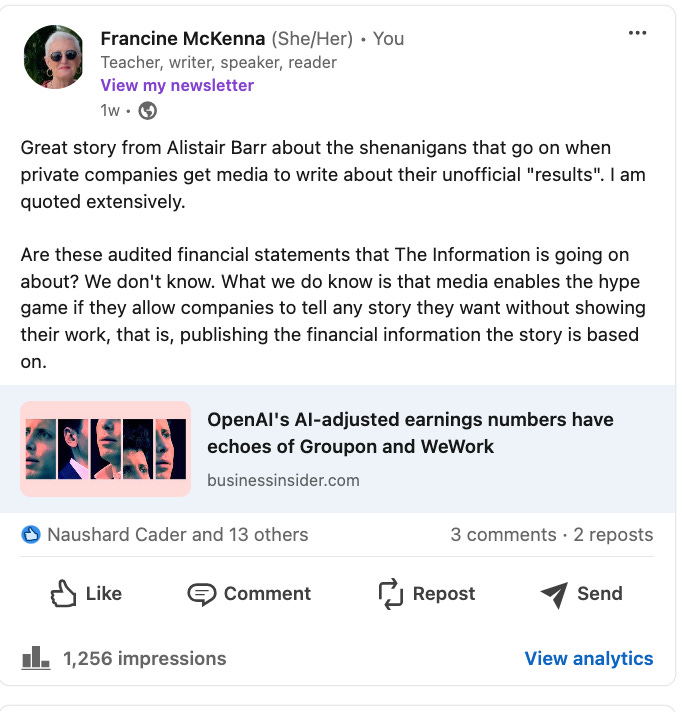Dancing in the dark: OpenAI and Microsoft, PCAOB critics
There will be more on OpenAI once Microsoft actually discloses something. Here's some quotes on that and the PCAOB criticisms in the meantime.
Microsoft and OpenAI
There is more news about Microsoft and OpenAI and we are getting closer to seeing the evidence of what the nature of the relationship really is. From the WSJ:
As OpenAI’s biggest investor by far, Microsoft could end up owning a large stake in what would be, by current measures, the second-most-valuable startup in the U.S. behind SpaceX.
In a sign of how significant the outcome will be for Microsoft and OpenAI, both have hired investment banks to advise them on the process. Microsoft is working with Morgan Stanley and OpenAI has tapped Goldman Sachs, according to people familiar with the matter.
In addition to figuring out how big a piece of the restructured artificial intelligence company Microsoft will own, the two sides must figure out what governance rights it will have.
It is unusual for nonprofits to convert to for-profit companies and particularly so for a company of OpenAI’s size and value.
Microsoft, other private investors and OpenAI employees currently own rights to future profits generated by a for-profit subsidiary controlled by OpenAI’s nonprofit board. Their returns are capped based in part on when they were issued these profit participation units.
Microsoft has invested $13.75 billion in OpenAI since 2019, including its share of the startup’s latest $6.6 billion fundraise. Its earlier investments were made when OpenAI was worth substantially less than it is today...
Microsoft and OpenAI have a complex relationship in which the two companies are closely tied both financially and technologically. Microsoft is OpenAI’s exclusive cloud provider and uses its technology for the Copilot AI application. At the same time, Microsoft has been growing its own AI capabilities and Altman has been looking for other sources of cloud computing power.
My very knowledgeable source, contacted in the last month, says it is a partnership, based on Microsoft's internal investments in the product and its handling of credits for OpenAI as a customer. There is no equity investment, yet.
Olga Usvyatsky and I have written about that last November and nothing reported since, and no disclosures by Microsoft, have contradicted our view.
Cross post: What can accounting tell us about Microsoft's partnership with OpenAI?
This is a cross post from Deep Quarry, a substack newsletter by my friend and frequent collaboration partner Olga Usvyatsky.
Now Alistair Barr at Business Insider has written about a report from The Information about the financial statements for OpenAI that The Information has supposedly reviewed.
There is enough detail there to say they looked at something, but what?
Barr focuses on how OpenAI tries to use adjustments to tell another story about its profitability. I am quoted.
'Not kosher'
I also asked an accounting expert to go on the record about this. I chatted with Francine McKenna, who writes The Dig, a blog focusing on accounting, audit, and corporate-governance issues at public and pre-IPO companies. She used to work at KPMG Consulting and PwC, and implemented accounting and financial systems, including SAP and Oracle ERP software, for big companies.
She knows accounting and technology well. She read The Information story closely on Thursday and had this to say about OpenAI's efforts to get investors to ignore the cost of training its AI models.
"That is a bridge too far," McKenna told me. "It's not kosher."
For an AI company like OpenAI, training models will be an ongoing process. The world is constantly evolving, and new data is being generated, which will have to be incorporated into AI models' understanding.


